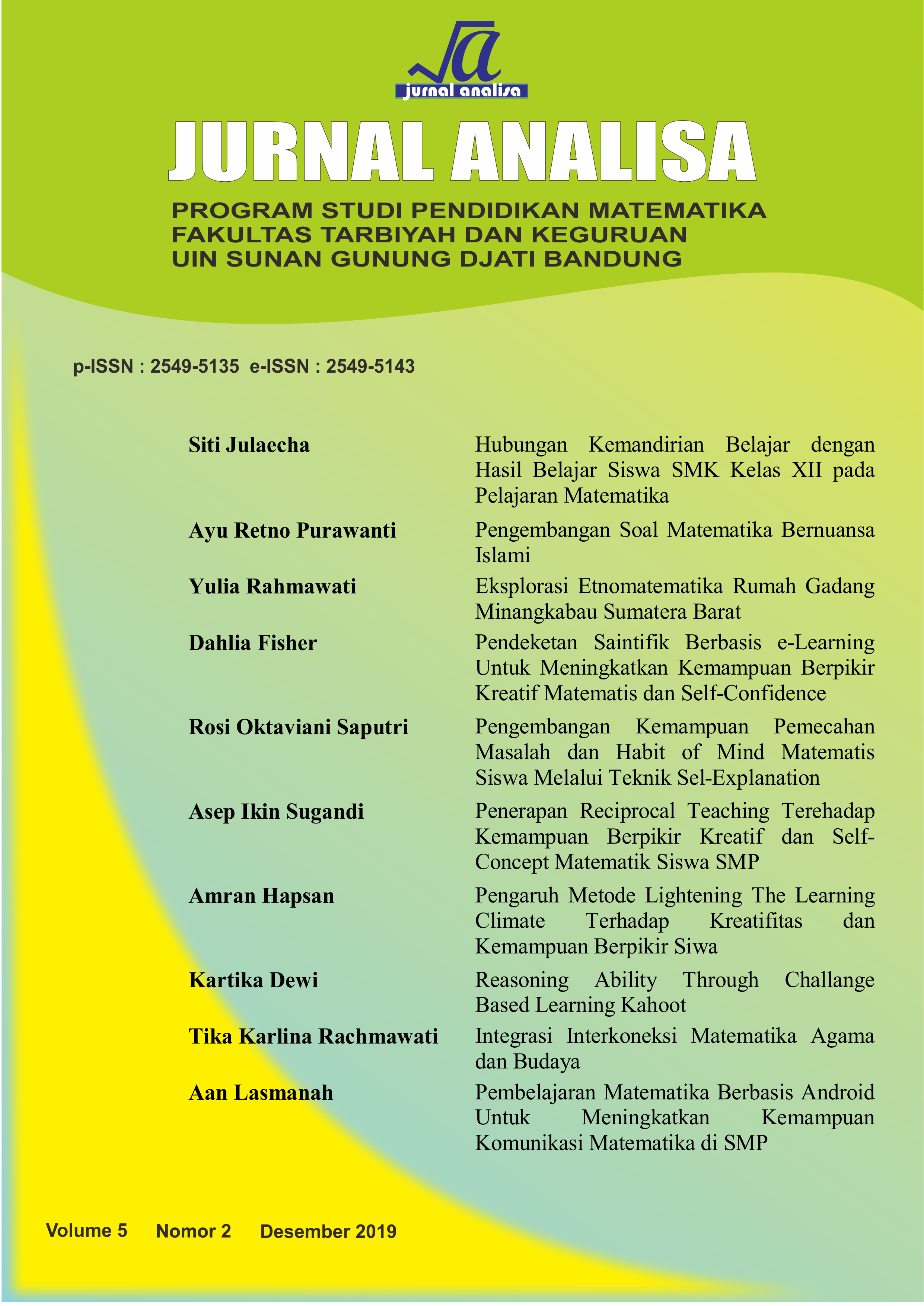Penerapan reciprocal teaching terhadap kemampuan berpikir kreatif dan self concept matematik siswa SMP
DOI:
https://doi.org/10.15575/ja.v5i2.6350Keywords:
Creative thinking, self concept, reciprocal teaching.Abstract
Tujuan penelitian ini adalah untuk menguji efektivitas penggunaan Reciprocal teaching dalam meningkatkan kemampuan berpikir kreatif matematik siswa. Metode dalam penelitian ini adalah metode kuasi eksperimen. Populasi dalam penelitian ini adalah seluruh siswa Sekolah Menengah Pertama Negeri di kota Cimahi, sedangkan sampel dipilih kelas VII dari salah satu Sekolah Menengah Pertama Negeri di kota Cimahi. Instrumen dalam penelitian ini adalah tes berbetuk soal uraian yang terdiri dari 5 pertanyaan untuk mengukur kemampuan berpikir kreatif dan non tes dalam bentuk skala Likert untuk mengukur self concept. Berdasarkan pengolahan data, didapat kesimpulan bahwa pendekatan reciprocal teaching  lebih efektif daripada pendekatan biasa ditinjau dari kemampuan berpikir kreatif dan self concept siswa.
The purpose of this study was to examine the effectiveness of using Reciprocal teaching in improving students' mathematical creative thinking abilities. The method in this study is a quasi-experimental method. The population in this study were all State Junior High School students in the city of Cimahi, while the sample was selected grade VII from one of the Public Middle Schools in the city of Cimahi. The instrument in this study was a test in the form of a question description consisting of 5 questions to measure the ability to think creatively and non-test in the form of a Likert scale to measure self concept. Based on data processing, it was concluded that the reciprocal teaching approach is more effective than the usual approach in terms of students' creative thinking abilities and self concept.
References
Agustiani, H. (2009). Psikologi Perkembangan (Pendekatan Ekologi Kaitannya dengan Konsep Diri dan Penyesuaian Diri pada Remaja). Bandung: Refika Aditama.
Akmalia, N. N., Pujiastuti, H., & Setiani, Y. (2016). Identifikasi Tahap Berpikir Kreatif Matematis melalui Penerapan Model Problem Based Learning dengan Tugas Pengajuan Masalah. JPPM (Jurnal Penelitian dan Pembelajaran Matematika), 9(2).
Arends, R. (1997). Classroom Instruction and Management. McGraw-Hill Companies.
Awaliah, R., & Idris, R. (2015). Pengaruh Penggunaan Model Reciprocal Teaching terhadap Hasil Belajar Matematika Siswa Kelas VIII MTSN Balang-Balang Kecamatan Bontomarannu Kabupaten Gowa. MaPan: Jurnal Matematika Dan Pembelajaran, 3(1), 59–72.
Borich, G. D. (1988). Effective Teaching Methods. Pearson Education India.
Chua, Y. P. (2004). Creative and Critical Thinking Styles. Universiti Putra Malaysia Press.
Cotton, K. (1991). Teaching Thinking Skills. Northwest Regional Educational Laboratory, School Improvement Program.
Desmita. (2010). Perkembangan Psikologi (4th ed.). Bandung: PT. Remaja Rosdakarya.
Fardah, D. K. (2012). Analisis Proses dan Kemampuan Berpikir Kreatif Siswa dalam Matematika Melalui Tugas Open-Ended. Kreano, Jurnal Matematika Kreatif-Inovatif, 3(2), 91–99.
Hendriana, H., Rohaeti, E. E., & Sumarmo, U. (2017). Hard Skills dan Soft Skills Matematik Siswa (I). Bandung: Refika Aditama.
Leonard, L., & US, S. (2010). Pengaruh Konsep Diri, Sikap Siswa pada Matematika, dan Kecemasan Siswa terhadap Hasil Belajar Matematika.
Liu, H. J. (2009). Exploring changes in academic self-concept in ability-grouped English classes. Chang Gung Journal of Humanities and Social Sciences, 2(2), 411-432.
Munandar, U. (2009). Kreatifitas Pengembangan Anak Berbakat. Jakarta: Rineka Cipta.
Novianti, M., Zubaidah, R., & Hamdani. (2017). Pengaruh Pendekatan Open-Ended terhadap Kemampuan Berpikir Kreatif Siswa Sekolah Menengah Pertama. Jurnal Pendidikan Dan Pembelajaran Khatulistiwa, 6(2), 1–10.
Putra, H. D. (2014). Tahap Perkembangan Kognitif Matematika Siswa MTs Asy Syifa Kelas IX Berdasarkan Teori Piaget. Prosiding Seminar Nasional Pendidikan Matematika, 2, 224–230.
Rachmayani, D. (2014). Penerapan Pembelajaran Reciprocal Teaching untuk Meningkatkan Kemampuan Komunikasi Matematis dan Kemandirian Belajar Matematika Siswa. JUDIKA (Jurnal Pendidikan Unsika), 2(1).
Rahmawati, Y., Priatna, N., & Nurjanah, N. (2018). Meningkatkan Kemampuan Koneksi Matematis dan Self-Concept Siswa Melalui Pendekatan Saintifik pada Materi Trigonometri. JMPM: Jurnal Matematika Dan Pendidikan Matematika, 3(2), 108–122.
Sumartini, T. S. (2015). Mengembangkan Self Concept Siswa melalui Model Pembelajaran Concept Attainment. Mosharafa: Jurnal Pendidikan Matematika, 4(2), 48–57.
Trianto, M. P. (2009). Mendesain Model Pembelajaran Inovatif-Progresif. Jakarta: Kencana.
Uyanto, S. S. (2009). Pedoman Analisis Data dengan SPSS. Yogyakarta: Graha Ilmu.
Widayati, W., Suyono, S., & Rahayu, W. (2018). Pengaruh Model Pembelajaran Berbasis Penemuan terhadap Kemampuan Berpikir Kritis Matematis dan Self Concept dengan Mengontrol Kemampuan Awal Peserta Didik Kelas VII SMP. JPPM (Jurnal Penelitian dan Pembelajaran Matematika), 11(1).
Downloads
Published
Issue
Section
License
Authors who publish in Jurnal Analisa agree to the following terms:
1. Authors retain copyright and grant the journal right of first publication with the work simultaneously licensed under a Attribution-ShareAlike 4.0 International (CC BY-SA 4.0) License that allows others to share the work with an acknowledgment of the work's authorship and initial publication in this journal.
2. Authors are able to enter into separate, additional contractual arrangements for the non-exclusive distribution of the journal's published version of the work (e.g., post it to an institutional repository or publish it in a book), with an acknowledgment of its initial publication in this journal.
3.Authors are permitted and encouraged to post their work online (e.g., in institutional repositories or on their website) prior to and during the submission process, as it can lead to productive exchanges, as well as earlier and greater citation of published work (See The Effect of Open Access).


